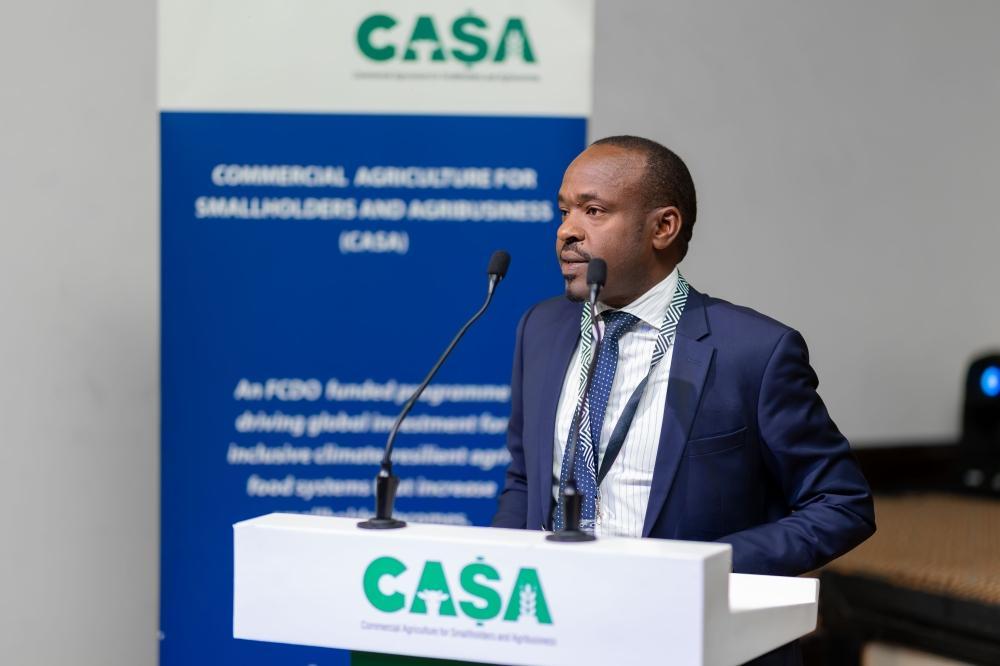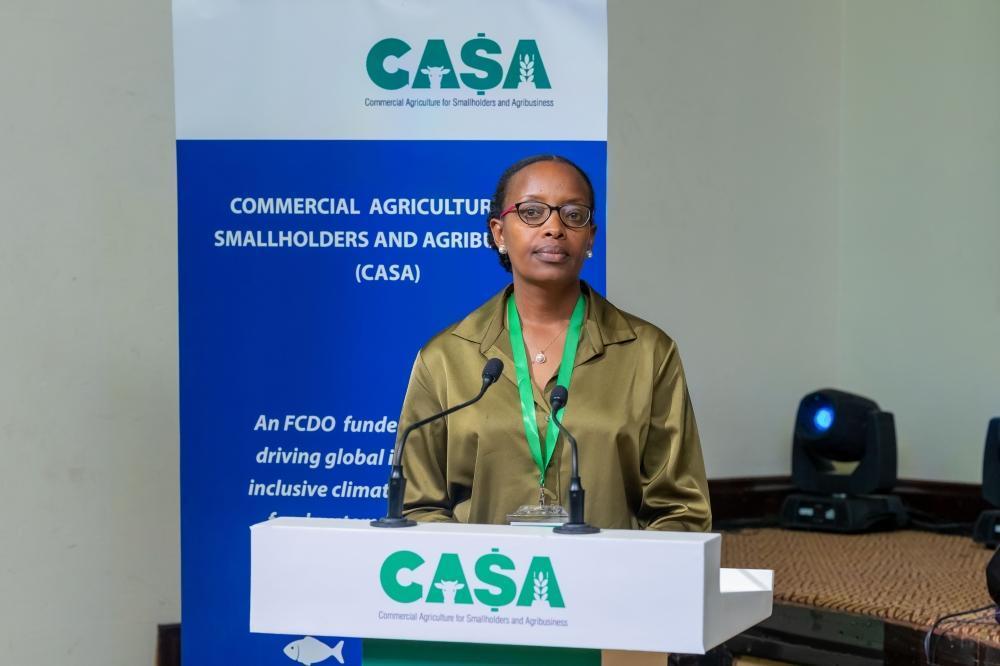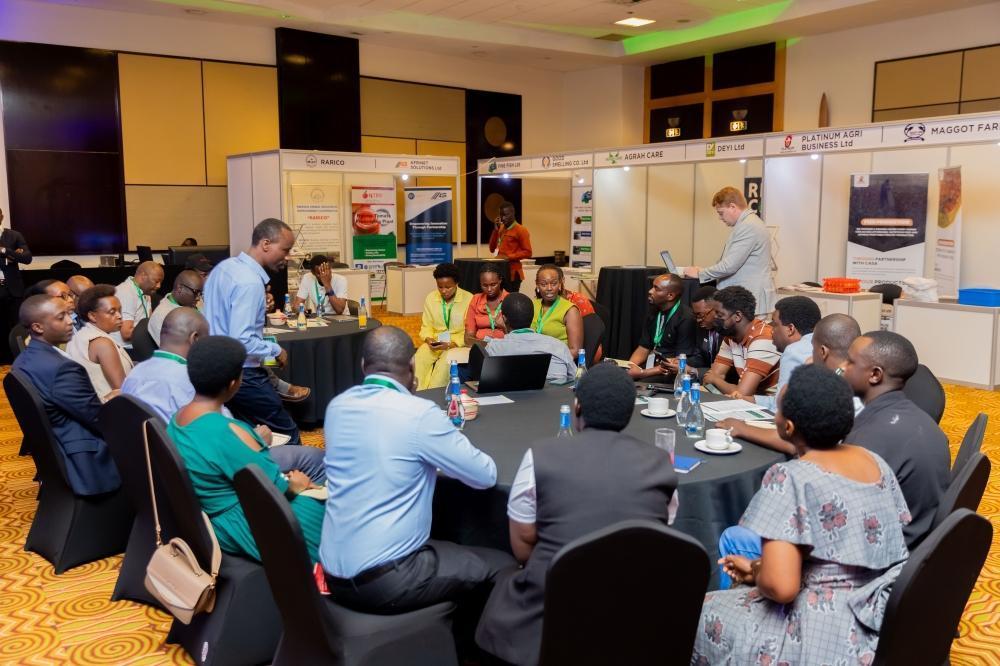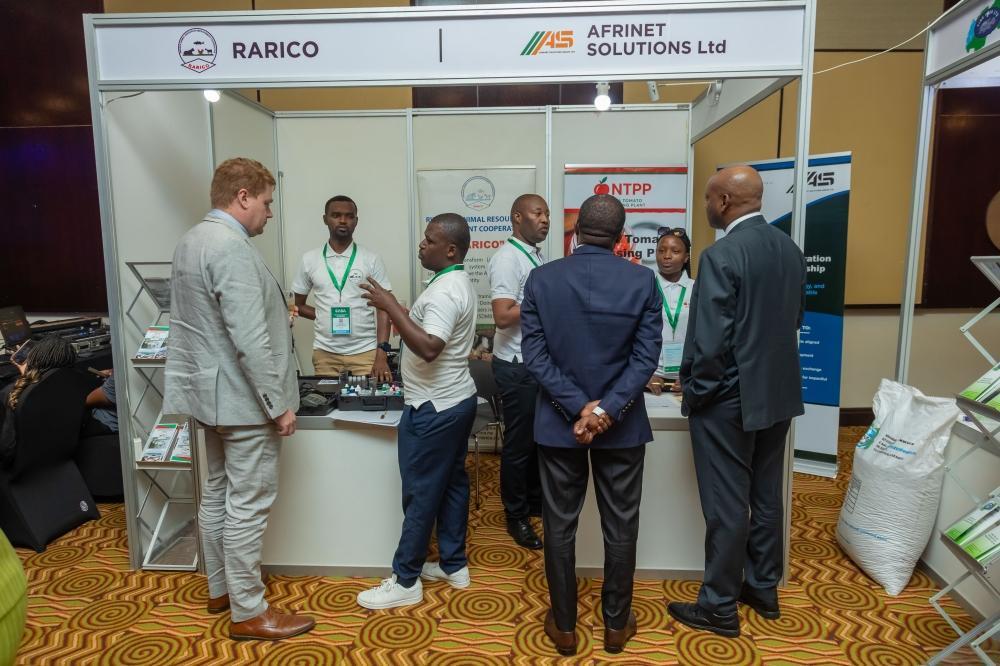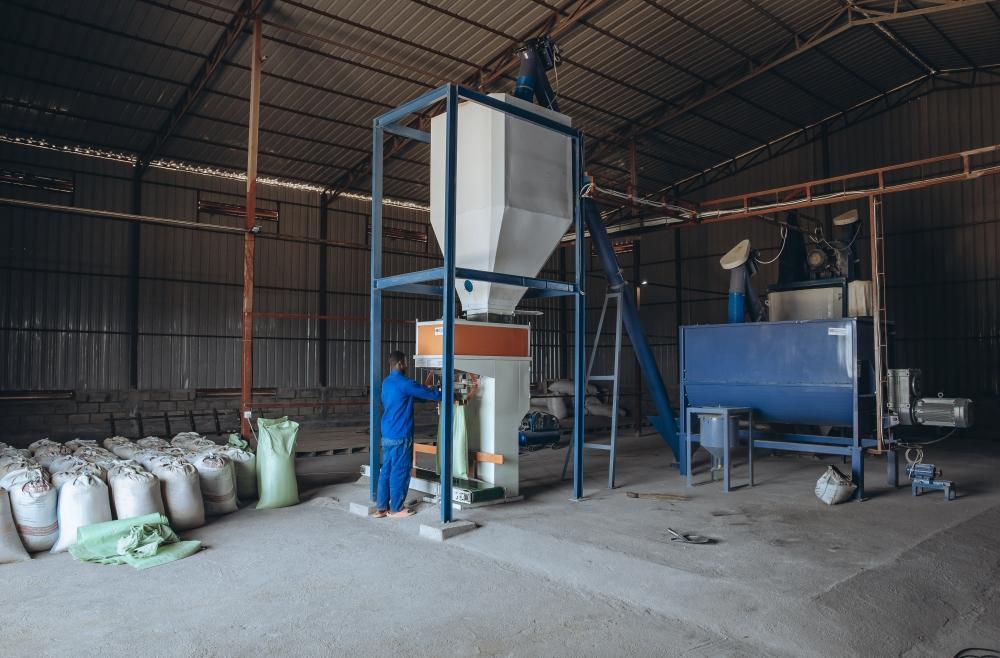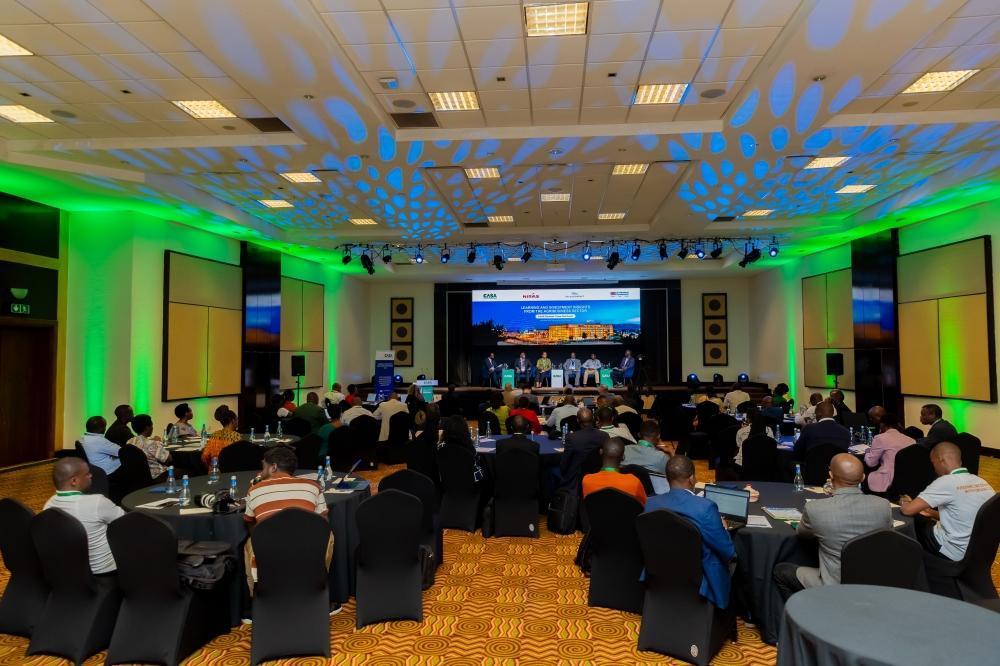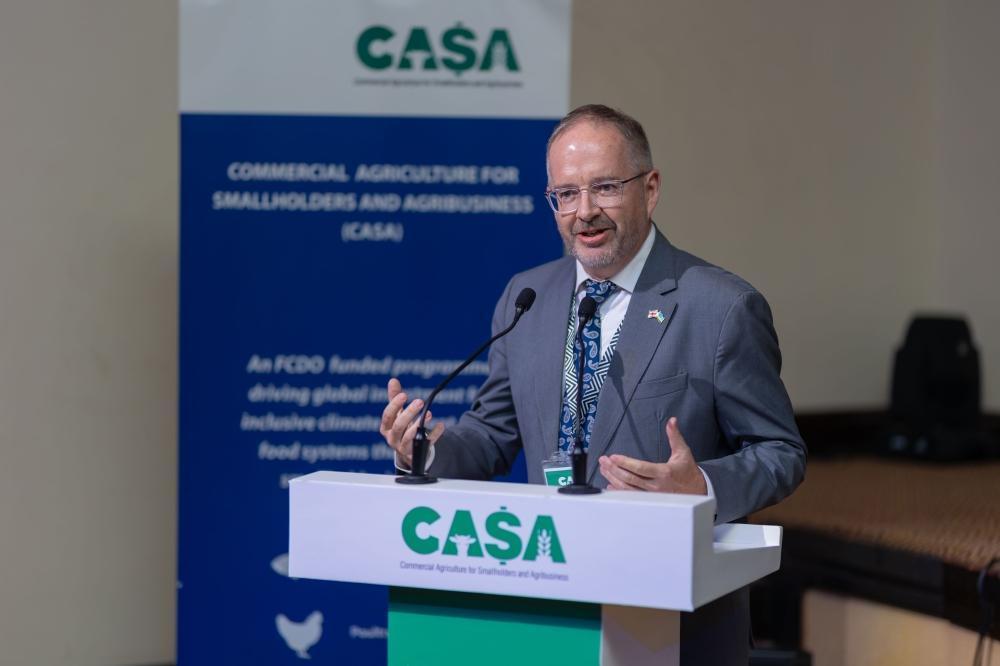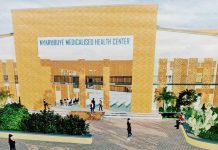Africa-Press – Rwanda. The Commercial Agriculture for Smallholders and Agribusiness (CASA) Programme in Rwanda has left a tangible mark on the country’s agribusiness sector, empowering small and medium enterprises to grow sustainably and demonstrate the business case for investment in agriculture.
One of its success stories is Florence Batoni, Managing Director of Platinum Agribusiness Ltd (PA), whose enterprise has grown through CASA’s support since 2023.
Florence Batoni, Managing Director of Platinum Agribusiness Ltd (PA).
Batoni said the farm currently employs 17 permanent staff and about 45 workers in total, including casual labourers. CASA’s partnership with PA focused on asset grant of providing a Feed mill, technical assistance to PA on finance and other fiduciary management tools and systems, as well as training of small farmers on modern poultry farming practices. Through a cost sharing model, CASA supported PA with a feed mill of 2-3tons which has supported PA to gain control over feeds production for their farm.
“That is very, very important to us. It has really situated us as a farm that is transforming from subsistence to going towards a modern farm,” she said.
Active discussions on a learning paper about animal feed during the CASA Rwanda event.
The company has since achieved full self-sufficiency in feed production.
“We have been able to reduce cost of production on feeds. We have been able to shift completely from feed companies to our own production. We are feeding our farm 100 per cent all types of feeds for layers. This increased the quality of feeds and eggs as well as reducing the mortality of our chickens due to a protein based formulation,” Batoni explained.
Partners supported by CASA showcased their enterprises to participants during the event.
She noted that before setting up the feed mill, “The mortality rate was extremely high,” adding that when the chickens reached 12 months, “We could lose up to 20 chickens a day.” Now, she said, “We rarely can lose more than one to three.”
Through CASA’s partnership, Platinum Agribusiness is also training smallholder farmers and plans to supply them with quality feed. To enable this, the company is working with the Rwanda Standards Bureau under the Zamukana Ubuziranenge programme, which helps SMEs obtain product certification.
Platinum Agribusiness feed production.
A standard audit was also carried out for PA by RSB and PA is in process to implement standards for farming and feeds so that it could in future obtain ISO standards for both eggs and feeds. These are future opportunities that will be achieved by PA as result of engaging in feeds production through collaboration with CASA. This is very important to us that the partnership has situated us as a farm that is transitioning from subsistence going towards a modern farm,” she said. Our feeds have already been tested in RSB laboratory and results meet standards.
In respect to technical assistance, PA understood their business in terms preparations of financial statements, tax compliance and improvement of business plans which are key elements for efficiencies and investment readiness.
The CASA Rwanda Investment and Close-out event was held on Tuesday, November 4, in Kigali.
She also encouraged people to eat eggs for better nutrition, noting that eggs are rich in protein and essential nutrients. She also calls upon local investors to invest in grain cropping especially soya bean and maize which have become cash crops competed for by both human and livestock consumption.
Besides CASA’s support PA prides in on going partnership between PA and BDF under another cost sharing model for the Commercialization and De-Risking for Agricultural Transformation Project (CDAT) where PA was financially supported to construct a chicken house for 10,000 chicken and buy a farm truck. PA also acknowledges another significant support from Government of Rwanda that supports the co-financing of poultry insurance against various risks. The farm has expanded from 30,000- 40,000 and hopes to reach a target of 50,000 chicken.
The CASA Rwanda programme, implemented by Swisscontact and NIRAS since October 2022, and funded by the UK’s Foreign, Commonwealth and Development Office (FCDO) through International Climate Finance (ICF), has demonstrated how inclusive support can boost the performance of smallholder-linked agribusinesses and attract private investment.
During CASA Rwanda’s close-out event held on Tuesday, November 4, in Kigali, agriculture sector stakeholders praised the programme’s contribution to innovation, collaboration, and sustainable growth.
Kagabo Nkubito, CASA Rwanda Country Manager, said the programme worked with government institutions and the private sector to support nine enterprises across poultry, aquaculture, and vegetables value chains, along with two service providers.
He cited Platinum Agribusiness as a key example in local poultry feed production, alongside partnerships with B5CD under an out-grower scheme in Bugesera District and Maggot Farm in Kamonyi District, which produces Black Soldier Fly larvae to convert organic waste into animal feed.
In aquaculture, CASA partnered with Fine Fish (fish feed production in Rwamagana), Good Smelling Company (fish aggregation in Kayonza), and RARICO (supporting over 30 fish cooperatives nationwide). For vegetables, it worked with DEYI (mushroom production and processing), AGRAH CARE (vegetable aggregation in Gatsibo), Agrilec (supplying vegetables to over 27 schools in Kayonza), and Afrinet (investing in the Ngoma Tomato Processing Plant). The programme also partnered with BDO East Africa to strengthen financial readiness among enterprises.
“Through our investment facilitation work, we have helped unlock financing opportunities, encouraged blended investment models, and built a stronger pipeline of agribusinesses that are ready for commercial investment,” Nkubito said.
To date, CASA Rwanda partners have reached 21,000 farmers, with another 9,000 expected by next month. The programme has leveraged over £255,000 in commercial investment and mobilised more than £1 million (Rwf1.8 billion) in counterpart contributions from private partners.
“Today’s event is therefore not just a closing; it is a moment of reflection and forward thinking,” Nkubito observed on Tuesday. “As we share lessons, impact, and future opportunities, our hope is that CASA’s experience will inform and inspire ongoing efforts to attract more private investment into Rwanda’s agriculture sector—ensuring that growth is both inclusive and sustainable.”
According to Steve Morris, CASA Programme Team Leader, the programme aimed to show the business case for agricultural investment. Over the past three years, he noted, smallholder-linked agribusinesses have matured, with some now securing grants or commercial loans and operating independently.
“They’ve become, as we call, investment ready. Some have actually achieved investment. They’ve received either grant funding or commercial loans from the banks, and they are now at a stage where they are able to grow on their own, without any further support from us,” he said.
He added that CASA Rwanda has produced three learning papers—on Rwanda’s investment environment, localisation of animal feed production, and opportunities linked to the National School Feeding Programme—to be published on the CASA website soon.
Underscoring the importance of collaboration with CASA, Clement Egide Kabano Niyitegeka, Partner in Charge of Risk Advisory Services at BDO East Africa, pointed out that both organisations had a shared goal of building investment readiness among SMEs.
“We decided to pool our resources to deliver joint technical support. SMEs make up 90 percent of businesses in Rwanda, so supporting them is crucial. By helping them become investment-ready, we’re not just building enterprises—we’re strengthening the entire economic ecosystem.”
Rob Hale of the British High Commission in Kigali praised CASA’s achievements, highlighting Platinum Agribusiness for creating jobs and boosting Rwanda’s foreign exchange through egg exports to Eastern DRC.
Rob Hale, Head of Green Growth and Trade at the British High Commission in Kigali and FCDO focal person, commended CASA’s success stories such as Platinum Agribusiness, which now employs 50 people and exports eggs to Eastern DRC, contributing to Rwanda’s foreign exchange earnings.
“The idea behind the programme is to demonstrate the viability of these business models and explore how they can be scaled up—potentially without relying heavily on international development finance,” he said.
Hannington Namara, Managing Director of Equity Bank Rwanda and Chairperson of the Rwanda Bankers’ Association, appreciated CASA’s support to smallholder farmers and reaffirmed the banking sector’s commitment to advancing agribusiness.
Hannington Namara, Managing Director of Equity Bank Rwanda and Chairperson of the Rwanda Bankers’ Association, also appreciated CASA’s support to smallholder farmers and reaffirmed the banking sector’s commitment to advancing agribusiness.
“We will do our part – I want to promise on behalf of the Rwanda Bankers’ Association – particularly in the space for youth and women in agriculture mainly, to develop products that are supportive,” he said. “You’ll count on Equity Bank and the Rwanda banking fraternity for us to continue doing our part. Where development finance has stopped, commercial finance can take over.”
For More News And Analysis About Rwanda Follow Africa-Press

